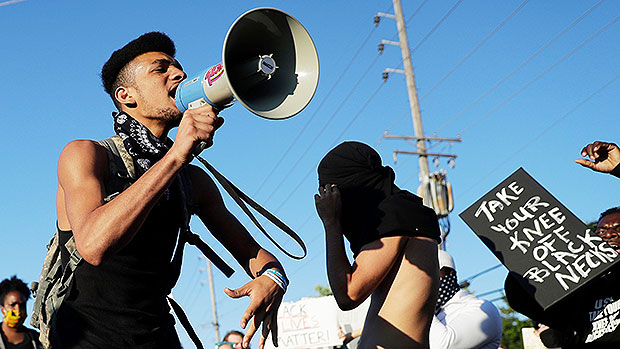Why LA & NYC Protesters Curfew-Breaking Charges Won’t Be ‘Automatically Dropped’

Experts say charges won’t immediately be dropped for protesters who were arrested for breaking curfew, despite LA & New York DAs announcing they’re not going to prosecute.
District Attorneys across the country have announced they’re declining to prosecute those who were arrested while protesting in the wake of George Floyd‘s tragic killing. Los Angeles County District Attorney Jackie Lacey announced on June 8 that she will not file charges against any protester for a curfew violation or failing to disperse. Manhattan District Attorney Cyrus Vance made the announcement on June 5 that he will not prosecute protesters who were arrested for breaking the city’s curfew, unlawful assembly or disorderly conduct during the ongoing demonstrations. HollywoodLife spoke EXCLUSIVELY with two criminal attorneys – one based in New York and one in LA – who explained that although the District Attorneys have decided not to prosecute, protesters may not be off the hook right away.
Julie Rendelman, New York criminal attorney explained, “Charges are not automatically dropped,” she explains. “Once the NYPD makes an arrest, an individual’s fingerprints and picture is taken for processing. As long as the arrested individual has no outstanding warrants, the district attorney’s office will decline to prosecute each individual defendant and paperwork will be filed that supports that prosecutorial decision. One would assume that if the NYPD is aware that the prosecutor is no longer going forward with these types of cases, they will stop making arrests for those particular charges.”
Previously, the District Attorney’s Office’s policy was to offer individuals charged with these low-level offenses an Adjournment in Contemplation of Dismissal, meaning their cases would be dismissed within six months. Under the new policy, the District Attorney’s Office declines to prosecute these arrests in the interest of justice. “I would hope that the prosecutors will make it their goal to quickly dismiss these matters. The entire process can take several days, particularly if there are a large number of defendants in the system whose cases need to be dismissed,” Rendelman said.
She also explained why the District Attorneys may have decided not to prosecute these cases and what this means for those who were arrested during the protests. “Since the coronavirus pandemic shutdown began in NYC, the District Attorney’s offices have declined to charge many low level nonviolent misdemeanors, citing health concerns when going through central booking and the need to focus their resources on the more serious and violent crimes,” she stated. “That reasoning still holds true when it comes to the decision to decline prosecution in the recent cases brought against protesters. Further, any potential punishment for crimes that stem from peaceful protesting would seem misguided in a time where individuals are justifiably expressing their desire for real change in racial inequities as it relates to law enforcement.”
Nicholas M. Loncar, Esq., LA criminal defense attorney explained that the Los Angeles District Attorney’s office isn’t even responsible for filing charges against protesters who have broken the curfew. He said, “It would actually be the LA City Attorney’s office tasked with filing those cases.” Loncar added, “In the City of Los Angeles, the City Attorney’s office files misdemeanor cases, and the LA County District Attorney’s office files felony cases. Many arrests do not result in criminal charges. The prosecuting agency can decline to file for a number of reasons, including insufficient evidence, or simply in the interest of justice.”
As for whether the charges will be filed, Loncar painted a similar scenario to the one in New York. “The City Attorney’s office will likely not file the cases for a number of reasons,” Loncar continued. “First, it would be a practical nightmare. Courts are dealing with heavy backlog due to COVID-19 closures, and having hundreds of protesters in court would create quite a circus. It would also be an unpopular and heavily criticized move in Los Angeles. Neither of these reasons means, however, that the prosecuting agency disagrees with the arrests. Prosecutors can agree with an arrest, while also believing that further action is unnecessary. Enforcement of a temporary curfew is a prime example of a situation where expending court resources months later might be deemed unnecessary.”